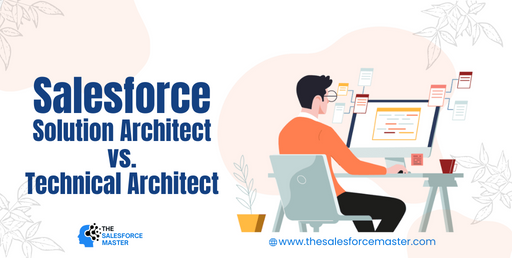 Salesforce Architect positions represent prevalent career aspirations within the ecosystem. These professionals are acknowledged for their extensive Salesforce expertise and their ability to devise scalable and robust solutions on the platform.
Salesforce Architect positions represent prevalent career aspirations within the ecosystem. These professionals are acknowledged for their extensive Salesforce expertise and their ability to devise scalable and robust solutions on the platform.
Among the various architect roles, solution architects and technical architects stand out as the most common. Although there are certain similarities between these roles, they remain distinct, underscoring the significance of comprehending their differences. Let’s delve into these distinctions!
Salesforce Architect Roles

Salesforce Architect career paths can be intricate within the Salesforce ecosystem, featuring roles such as solution and technical architects. In larger enterprises, additional positions like enterprise, data, and transformation architects may also exist.
Various certifications further enrich this landscape, including Salesforce System and Application Architect certs, Salesforce B2B and B2C Solution Architect certs, and the esteemed Salesforce Certified Technical Architect cert – widely considered the most challenging Salesforce credential to achieve.
This discussion aims to delve into the fundamental distinctions between Salesforce Solution and Technical Architect roles, elucidating their differences, commonalities, and helping individuals discern which aligns best with their career aspirations.
Architect roles are typically prevalent in intricate Salesforce implementations. Given the complexity of these roles, extensive experience with Salesforce is a prerequisite. Consultancies undertaking Salesforce implementations for sizable clients seek professionals with the expertise, knowledge, and experience of architects to navigate challenging and technically complex requirements successfully.
These roles are commonly found in substantial Salesforce end-users, especially those with a substantial user base (e.g., 1,000+) or those utilizing a customized instance with significant custom code and integrations. In the absence of architects in such complex Salesforce implementations, establishing a scalable solution becomes challenging, leading to the accumulation of technical debt and an unreliable system.
Let’s begin by exploring Salesforce Solution Architects…
Solution Architects
Salesforce Solution Architects often stand out as an aspirational role for many Salesforce Administrators, embodying a position charged with comprehending an organization’s business needs and formulating scalable solutions in line with Salesforce’s recommended best practices. While this might seem reminiscent of the responsibilities of a Salesforce Admin or consultant, Solution Architects typically collaborate closely with these roles, leveraging their extensive project knowledge to shape the solution. What sets them apart is their ultimate responsibility for designing the solution and ensuring the build aligns with agreed specifications.
 In their leadership capacity, Solution Architects take charge of key project areas, such as data modeling, migration, Salesforce configuration, security models, declarative automation, and user experience. Their crucial role extends to overseeing the successful deployment of the project, employing Sandboxes or a DevOps process.
In their leadership capacity, Solution Architects take charge of key project areas, such as data modeling, migration, Salesforce configuration, security models, declarative automation, and user experience. Their crucial role extends to overseeing the successful deployment of the project, employing Sandboxes or a DevOps process.
Now, you might be wondering about Technical Architects.
Technical Architects
Salesforce Technical Architects are often considered a coveted role for many Salesforce Developers. They serve as the ultimate technical authority in projects, ensuring that the solution aligns with the correct technical specifications.
The role demands a deep understanding of Salesforce intricacies. This includes overseeing the proper development of Apex or Lightning Web Component code, adherence to best practices, and ensuring scalability. Technical Architects play a crucial role in managing data flows into and out of Salesforce, a particularly challenging aspect in large enterprise projects that frequently involve integrations.
Their responsibilities encompass leading various aspects of a project, such as overseeing custom Apex or Lightning Web Component code, managing integrations with external systems, designing APIs, handling large data volumes, overseeing environment management, and implementing DevOps processes. In essence, they are instrumental in ensuring the technical success of Salesforce projects.
Core Similarities & Differences
If the explanations provided earlier still seem unclear, there’s no need to worry; there are numerous similarities between the roles of Salesforce Solution Architect and Salesforce Technical Architect. However, the key distinction lies in their primary focuses. The Salesforce Solution Architect is dedicated to ensuring the design and implementation of a scalable solution that aligns with the customer’s business requirements. On the flip side, the Salesforce Technical Architect delves into the intricate technical aspects of the project, often involving custom code and integrations with other systems.
Despite these distinctions, both Solution and Technical Architects frequently collaborate on projects, leading to a potential overlap in their responsibilities. It’s common for them to contribute to areas beyond their designated roles. For instance, a Solution Architect might leverage expertise in integrations, while a Technical Architect may provide insights into business requirements. These professionals are at the pinnacle of their respective fields!
It’s also worth mentioning the “Salesforce Enterprise Architect” role, which isn’t explicitly highlighted in the Salesforce ecosystem. In larger transformational projects encompassing various systems, where Salesforce is just one component, the Enterprise Architect takes on a holistic perspective. They oversee all systems, the data flow, and their integration into the business.
Summary
I trust this article has provided you with a concise understanding of the fundamental distinctions between two prominent roles within the Salesforce ecosystem.
While I noted that administrators may aspire to transition into solution architects, and developers into technical architects, it’s important to recognize that these are not strict rules. A Salesforce Admin without coding skills can certainly pursue a path to become a technical architect, and conversely, a developer aiming to engage more with the business side has the flexibility to do so.
For additional insights into the architect role, be sure to explore the wealth of posts available on The Salesforce Master

